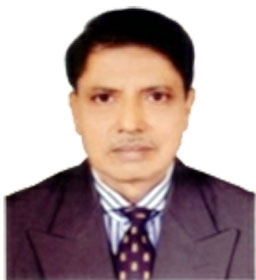
Dr. Forqan Uddin Ahmed :
The Father of the Nation Bangabandhu Sheikh Mujibur Rahman was arrested at around 1:30 am on 26 March 1971 from his Dhanmondi residence by the Pakistan Army. Later he was taken to West Pakistan and detained. At the beginning, no one knew where he was kept and how he was. Even no one could say whether he was alive or not, although it was said from Swadhin Bangla Radio that he was good and was with the people. This announcement was done repeatedly so that the Bengalis engaged in the war of independence did not lose their courage. However, it was confirmed that Bangabandhu was alive when Pakistan’s President General Yahya Khan announced the trial of Bangabandhu in a secret military court in Pakistan. Bangabandhu knew very well that the Pakistani military would arrest him. Some of his colleagues and friends asked him to leave the house while informing him of the situation over telephone. He could escape, but he did not. He said if he did that, then the Pakistani military would destroy entire Dhaka city to find him. This was published in the Washington Post on 30 March 1971 in a report by Simon Dring of the Daily Telegraph, London. That report also described the killing and atrocities of Pakistani army on the night of 25th March.
In a proposal of parliament on 9 August, 1971, President Yahya Khan of Pakistan informed that Sheikh Mujibur Rahman may by be executed. On the issue of death threat to Sk. Mujibur Rahman by president Yahya Khan was discussed in Lower House of Indian Parliament and it was like storms. Mr. Misrho participated in the discussion and told the house as follows. “If something happens to Sheikh Mujibur Rahman according to the designs of president Yahya Khan, then it would be difficult for India to send back the refugees, because never probably would calm come back to Bangladesh and, therefore, it would be very difficult for the refugees to return to Bangladesh; so, in such a case it would be difficult for India to remain a silent spectator to trial and execution of Sheikh Mujibur Rahman.”
On the trial of Sheikh Mujibur Rahman the then Indian Prime Minister Ms. Indra Gandhi sent a message to the world head of states foreign influence request over Pakistan. The content of the message was as follows. “Government and people of India as well as our press and parliament are greatly perturbed by reported statement of president Yahya Khan that he is going to start secret military trial of Sheikh Mujibur Rahman without affording him any foreign legal assistance. We apprehend that the so-called trial will be used only as a cover to execute Sheikh Mujibur Rahman. This will aggravated the situation in East Bengal and will create a serious situation in India because of the strong feelings of our people and all political parties. Hence our grave anxiety, we appeal to you to exercise your influence with president Yahya Khan to take a realistic view in the larger interest of the peace and stability of this region.”
On 14 August 1971, expressing his country’s concern about the trial of Sheikh Mujibur Rahman in the military court of West Pakistan, the spokesman of the Foreign Ministry of the German Democratic Republic said that the people of the GDR requested the government of Pakistan to do justice to Sheikh Mujibur Rahman. The people of GDR requested Pakistan’s military authorities to find a peaceful political solution to the existing conflict in Pakistan by stopping the trial of Sheikh Mujibur Rahman, one of the influential figures of Pakistan.
On 20 August, the Secretariat of the World Peace Council in Helsinki, urged the Pakistani government to release Sheikh Mujibur Rahman. The World Peace Council requested Yahya Khan to respect the wishes of the people of the world and immediately release Sheikh Mujibur Rahman stopping his trial. The East Bengal Refugees Assistance Committee of Nepal at its meeting in Kathmandu on 7 September adopted a resolution urging Pakistan for immediate release of Sheikh Mujibur Rahman.
Former British Secretary of State for Commonwealth Affairs Arthur Bottomley, at the conference of the Commonwealth Parliamentary Association held on 13 September 1971 in Malaysia, urged all governments to put pressure on Pakistan to release Sheikh Mujibur Rahman. The 13th September issue of the African Tribune published from Kinshasa said that if Sheikh Mujib was released only then necessary steps could be taken for a peaceful solution of the problem. On 15 September, a statement by US Senator Charles H Parcey was published on the Christian Science Monitor, which said that Pakistan would be condemned by the world if Sheikh Mujib was sentenced to death or life imprisonment.
Finally, the Pakistani government had to release our beloved leader, Father of the Nation Bangabandhu Sheikh Mujibur Rahman from jail. On 8 January 1972, Bangabandhu was released and went to London. From there he reached Dhaka on 10 January via New Delhi.
(The writer is former Deputy Director General, Bangladesh Ansar and VDP).

